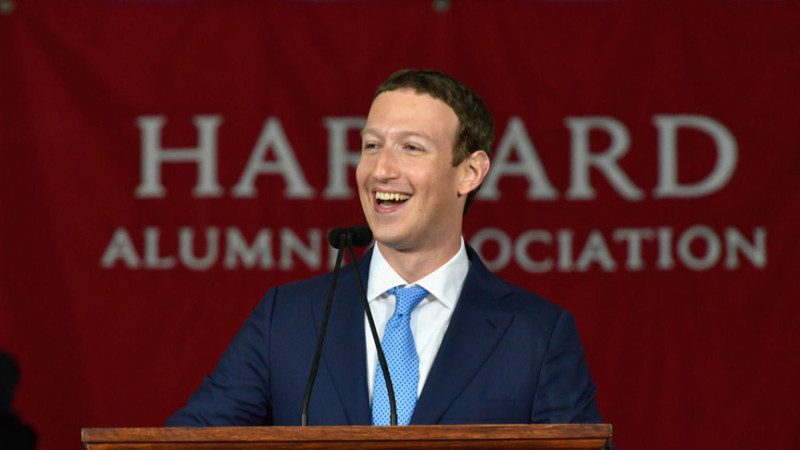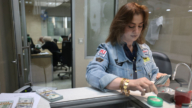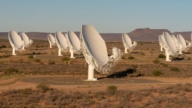【新唐人2017年05月30日訊】臉書聯合創始人兼CEO馬克·扎克伯格,2004年在哈佛大學讀書時創辦了臉書,之後輟學經營臉書。今年5月25日,扎克伯格回到母校參加2017屆畢業典禮,並發表演講。這是扎克伯格輟學13年後第一次返回母校對畢業生演講。
「如果我完成這個演講,這將是我在哈佛第一次真正完成的一件事情。」扎克伯格對自己能夠返回母校,參加一場畢業典禮非常激動。
回想自己的歷程,扎克伯格談到了他在哈佛大學的點滴,其中包括父母對他考上哈佛時的榮耀,他如何遇到自己的妻子Priscilla,如何開發了備受爭議的允許學生挑選最美個人的Facemash程序等,當然也包括他在宿舍內創業Facebook的經歷。
扎克伯格在演講中談到全民基本收入、司法改革、在線投票等眾多議題,鼓勵畢業生勇於追尋夢想,完成歷史賦予的使命。
相關視頻:
扎克伯格哈佛大學演講中文全文:
福斯特校長(Drew G. Faust)、校監委員會成員們、老師、校友、朋友、自豪的家長們、管理委員會的委員們,以及世界上最偉大學校的畢業生們!
今天和你們待在一起我備感榮幸,因為說實話,你們完成了一個我永遠無法辦到的成就。等我做完這個演講,這將是我第一次在哈佛大學完成的一件事。
2017畢業班的同學,祝賀你們!
我本不可能是站在這裡發表演講的人,不僅僅因為我是一名輟學生,還因為其實我們是同一代人。我作為學生走在這個校園裡,也就是不過十年前的事情。
我們學習過同樣的知識,同樣在EC10課堂上補覺。儘管我們通過不同的方式來到這裡,尤其那些來自Quad園區的同學(The Quad以前是Radcliffe College的女生宿舍。Radcliffe從1879至1977年是哈佛的女子學院,1977年匯入哈佛);但今天我想和你們分享的是,我對我們這代人的一些想法,和我們正在合力建設的這個世界。
首先,過去幾天令我想起很多美好的回憶。
你們當中多少人還確切記得,當初收到哈佛的錄取通知郵件時在做什麼?當時我正在玩《文明》遊戲,然後我跑下樓,找到我的父親,不過他的反應很奇怪,居然開始拍攝我打開郵件的過程。那個視頻可能看著挺難過吧,但我發誓,被哈佛錄取,仍然是最令我父母為我感到驕傲的事情。
你們還記得在哈佛上的第一節課嗎?我上的是計算機121,Harry Lewis老師超級棒。當時我要遲到了,于是抓了件T恤就套在身上,結果直到下午才發現我把它前後裡外都穿反了,商標都露在前胸。然後我還納悶怎麼沒人理我,除了一個人,KX Jin,他沒有在意這些。之後,我們開始組隊解決難題,現在他負責Facebook很大一塊業務。這說明什麼?2017的畢業生們,這說明為什麼你們應該對別人友善一些。
但是我在哈佛最美好的回憶,是我遇見了Priscilla(扎克伯格的太太)。當時我剛上線一個惡作劇網站Facemash,然後管理委員會表示「要見我」,所有人都認為我要被趕走了。我爸媽來幫我打包行李;我朋友幫我搞了個告別派對。幸運的事情就在這裡,Priscilla和她朋友一起,來到了這個Party。我們在Pfoho Belltower的衛生間外排隊時遇見了,接下來發生了一件永生難忘的浪漫事件——我說:「我三天後就要被趕出學校了,所以我們需要儘快開始約會。」
事實上,你們所有人都可以使用這個套路。
我沒有被開除——我想辦法留下來了,Priscilla開始和我約會。你們知道,那部電影(《社交網路》)說的Facemash對創造Facebook好像很重要似的。其實並非如此,但是沒有Facemash的話,我遇不到Priscilla。她是我生命中最重要的人,所以從這個角度說,Facemash是我人生中做出的最重要的一樣東西。
在這裡,我們開始結交一生的摯友,甚至有的以後會成為家人,這是為什麼我對這裡如此感激的原因。謝謝你,哈佛!
今天我想談談目標(Purpose),但是我不是來給你們做一些程序化的宣言,告訴你們如何發現目標的。我們是千禧一代,我們會出於直覺和本能發現目標。相反地,我站在這裡要說的,是僅僅發現目標還不夠。我們這代人面臨的挑戰,是創造一個人人都能有使命感的世界。
我最喜歡的一個故事,是約翰.F.肯尼迪訪問美國宇航局太空中心時,看到了一個拿著掃帚的看門人,于是他走過去問這人在幹什麼。看門人回答說:「總統先生,我正在幫助把一個人送往月球。」
目標是我們意識到我們是比自己更大的東西的一部分,是我們被需要的、我們需要更為之努力的東西。目標能創造真正的快樂。
今天,你在這個特別重要的時刻畢業了。當你父母畢業的時候,目標很大程度上來自工作、教會、社群。但是今天,技術和自動化正在代替很多工作,社區成員人數也在下降。許多人感到沮喪,感到自己被隔離開來了,同時也在努力填補空白。
當我走過很多地方的時候,我曾和許多被拘留的、阿片類藥物成癮的孩子們坐在一起,他們告訴我如果他們有事可做,參加課後活動或者有地方可去,他們的人生會變得很不一樣。我也遇到過很多工廠的工人,他們沒法再從事之前從事的工作了,所以試圖找到新的能做的事。
為了保持社會的進步,我們身負挑戰——不僅僅是創造新的工作,還要創造新的目標。
我還記得在Kirkland House的小宿舍中創造Facebook的那晚。我和我的朋友KX去了Noch。我記得我告訴他,我很開心能把哈佛的社群連接起來,但是有一天,有人會把整個世界都連接起來。
我完全沒有想到這個人會是我們。當時我們還只是大學生,對此還並不瞭解。所有這些大型技術公司都有資源,我只是認為其中一個大公司會做到這一點。但是,我對這個想法很確信——所有人都想和彼此連接,所以我們一直在朝這個方向努力前進。
我知道你們中的很多人也會有類似的故事。你覺得很多人都在改變世界,然而他們並沒有,而你會。
但是,光有目標是不夠的。你必須擁有心系他人的目標。
意識到這點非常難。我從來沒想過創造一個公司,我想要的是創造影響力。越來越多的人加入我們,我假設他們跟我關心的是同樣的東西,所以我從來沒解釋過我到底希望建立什麼。
幾年來,一些大公司想要收購我們。我拒絕了。我想知道是否能連接更多的人。我們正在建立第一個新聞流(News Feed),當時我想,如果我們能做到這一點,它可能會改變我們學習世界的方式。
幾乎所有人都想讓我把公司賣了。沒有更高遠的使命感,這個創業公司不可能夢想成真。經過激烈的爭論後,一位顧問跟我說,如果我不同意出售,我會後悔一輩子。一年左右的時間裏,當時的管理層幾乎都走了。
這是我在Facebook時最艱難的時刻。我相信我們在做的東西,但是我也感到孤獨。更糟糕的是,當時我覺得這是我的錯。我在想是不是我錯了,一個22歲的小孩,都不知道世界是怎麼運轉的。
多年以後的今天,我明白了那是因為沒有更高的目標。是否創造它取決於我們,所以我們能一起前進。
今天我想談談創造一個每個人都有使命感的世界的三種方法:一起做有意義的項目;通過重新定義平等,使每個人都有追求目標的自由;在全世界建立社群。
首先,讓我們來說說做有意義的項目。
我們這一代將不得不面對數千萬的工作被機器取代的情況,比如自動駕駛。但我們還有很多事能一起去完成。
每一代都有屬於自己一代的作品。比如有超過30萬人一起努力,讓人類登上了月球——包括那個看門的人;數百萬志願者為世界各地的小兒麻痺症患者打疫苗;數以百萬計的人為建立胡佛水壩和其他偉大的項目貢獻了自己的力量。
做這些項目的使命,並不僅僅是為人們提供工作,而是讓我們整個國家感到自豪,我們可以做一些偉大的事情。
現在輪到我們來做一些偉大的事了。我知道,你可能會想:我不知道如何建造大壩,或者如何讓一百萬人參與到任何事情中來。
但我想告訴你一個秘密:沒有人從一開始就知道如何做,想法並不會在最初就完全成型。只有當你工作時才變得逐漸清晰,你只需要做的就是開始。
如果我必須在開始(Facebook)之前就瞭解清楚「如何連接人」的想法,那麼我就不會啟動Facebook了。
或許電影和流行文化會讓人覺得被誤導,那些想法會出現在一些靈光一閃的時刻,這其實是一個危險的謊言。這讓我們感到不滿足,因為我們沒有了我們自己的(行動),它會阻止那些擁有好想法的人去開始。對了,你知道電影當中還有什麼是對創新的誤解嗎?那就是,沒有人會在玻璃上寫數學公式。那不是什麼事。
其實,理想主義是好事,但你要做好被誤解的準備。任何為了更大願景工作的人可能會被稱為瘋子,即使你最終獲得成功。任何為了複雜問題工作的人都會因為不能全面瞭解挑戰而被指責,即使你不可能事先瞭解一切。任何抓住主動權先行一步的人都會因為步子太快而受到批評,因為總是有人想讓你慢下來。
在我們的社會裏,我們並不經常做一些偉大的事,因為我們害怕犯錯。如果我們什麼都不做,我們就忽視了今天所有的錯誤。事實上,我們所做的任何事情將來都會有問題。但這不能阻止我們開始。
那我們還在等什麼呢?現在輪到我們這一代人定義「公共事務」的時候了。
在地球摧毀之前,如何阻止氣候變化?如何讓數百萬人願意參與製造和安裝太陽能電池板?如何治癒所有疾病?如何要求志願者跟蹤他們的健康數據和分享他們的基因組?今天,我們可能要花上50倍的價格去治療病人,而不是找到一種治療方法讓人類第一時間無法染上疾病。這並不合理,我們可以解決這個問題。民主現代化如何讓每個人都能在網上投票,以及通過個性化教育讓每個人都能學習?
這些成就在我們能力範圍內是可以實現的,讓我們讓每個人在我們社會中發揮其應有的作用來做這些事情。讓我們做一些偉大的事情,不僅要創造進步,而是要創造目標。
所以我們可以做的第一件事就是,創造一個每人都擁有使命感的世界。
第二件事是,重新定義平等,讓每個人都有追求目的的自由。
我們這一代人的父母,很多在整個職業生涯中都有穩定的工作。但是現在,我們這一代人都是企業家,無論我們是剛開始一些項目還是在尋找、或是已經扮演著這個角色。這都很棒,我們的創業文化恰好是導致我們創造如此多進步的原因。
現在,只要在嘗試很多新想法的時候,創業文化就會蓬勃發展。Facebook並不是我做的第一件事,我還做過遊戲、聊天系統、學習工具和音樂播放器。我並不孤獨,因為JK羅琳在出版《哈利波特》之前被拒絕了12次,即使碧昂絲也不得不寫了數百首歌曲,才有了今天Halo這首歌獲得的光環。最大的成功來自於我們享有失敗的自由。
然而,今天,財富不均會讓每個人都受到傷害。當你沒有自由把你的想法變成一個歷史性的企業的時候,我們就輸了。現在,我們的社會在通往成功的路上有過多的指引,但我們做的不夠,並不是每個人都能夠輕易得分(獲得成功)。
面對現實吧,我們的社會體系是有問題的,當我能夠離開哈佛並在10年內賺取數十億美元的時候,還有數百萬學生無法償還貸款,更不用說開始創業。
看,我認識很多企業家,然而我並不知道是否有一個人是因為沒有足夠的錢而放棄創業。但是我知道很多人不敢追求夢想,因為一旦他們失敗,並沒有很好的緩衝(承托住)。
我們都知道,想要成功,光憑一個好想法,或者一個好的工作態度,是遠遠不夠的。幸運也是成功很重要的因素。如果當初,我無法花時間編寫代碼,而是必須勤工儉學補貼家用,如果我無法承受「萬一Facebook不能成功」這一假設,我今天都不會站在這裡。誠實地想一想,我們都知道,(能夠有今天)自己是多麼的幸運。
每一代人的成長都擴大了平等的定義。前幾代人爭取投票權和民權,于是他們爭取到了有新政和大社會。現在到了我們為這一代人定義新的社會契約的時候了。
我們應該有一個不僅僅憑藉GDP這樣的經濟指標來衡量進步的社會,而是一個每個人都可以找到自己的存在意義和角色的社會。我們應該探索像「普遍基本收入」這樣的觀念,讓每一個人都有機會嘗試新事物。每個人都有可能換很多工作,這就要求我們得建立人人都負擔得起的兒童托管保育機構和不約束於就職單位的醫療保健,這樣讓人可以無負擔地去上班。人人都會犯錯,所以我們需要一個更少污蔑與束縛的社會。隨著技術的不斷變化,我們要更多地關注繼續教育,活到老,學到老。
是的,賦予每個人追求目標的自由,這並不是免費的。像我這樣的人應當為此付費。在你們之中,許多人都會做得很好,當然,你們也有義務去做好。
這也是為什麼當初Priscilla和我啟動了Chan Zuckerberg Initiative,並承諾要我們的財富去促進機會平等。這些是我們這代人的價值。」要不要這樣做」從來都不是問題,唯一的問題是「什麼時候去做」。
千禧一代已經是歷史上最慈善的一代人之一了。千禧一代的美國人在一年中,平均四個人裡就有三個人會捐款,平均十個人裡就有七個人會為慈善募捐。
但這也不僅限於金錢。你也可以奉獻你的時間。我在這裡向你保證,如果你可以每一兩週要花一個小時(去奉獻和幫助),就會有一個人因此獲得幫助,甚至實現他們以前不可能實現的目標。
或許你覺得這太花時間了。我曾經也這麼認為。當Priscilla畢業於哈佛後,她成了一名老師,在她和我一起投身教育行業之前,她告訴我,我需要去教授一門課。我抱怨道:「好吧,可是我很忙啊,我得經營Facebook啊。」但是她堅持讓我去教課,所以我就在當地的男童女童俱樂部教授了一門關於創業精神的中學課程。
我教他們在產品開發和市場營銷中應當吸取的教訓,從他們身上,我學到了當自己的種族受到社會關注、或有家庭成員身陷囹圄時的感受。我向他們分享了我讀書時的故事,他們分享了對走進大學深造的渴望。五年來,我每個月都會和這些孩子一起共進一次晚餐。其中有一個孩子,為我與Priscilla的第一個寶寶在出生前,舉辦了寶寶洗禮派對。明年,這些孩子們都要上大學了,是的,他們每一個都要上大學了,而且他們都將驕傲地成為自己家族裡第一名大學生。
花一點時間,去幫助其他人,這是我們每個人都可以做到的。讓我們通過此舉,讓每個人都有實現人生目標的自由——不僅因為這樣做是正確的,更是因為當人們可以把夢想變為偉大的現實時,我們每個人都會變得更好。
「目標」不僅來自於工作。去實現「讓每個人都有活的有目標」的第三種方式是建立社區。而當我們這一代人說「每個人」的時候,我們指的是——世界上的每一個人。
來做一個調查:你們有多少來自美國之外其他國家?你們中有多少人是他們的朋友?看到了嗎?我們出生於一個互聯的世界。
在最近一項調查中,世界各地的80後90後被要求選擇自己認同的身份,最流行的答案不是國籍,宗教或種族,它是「世界公民」。
這是一個標誌性的事件。
每一代人都擴大了我們認同的「自己人」。對我們來說,它現在涵蓋了整個世界。
回顧歷史,歷史的車輪總是青睞於更大基數的集體-從部落到城市到國家-來實現我們不能單獨做的事情。
我們認為現在最大的機會是全球性的-我們可以成為終結貧窮和結束疾病的一代人。但同時我們也意識到我們面臨的巨大挑戰也需要全球性的協作-沒有一個國家可以單獨應對氣候變化或預防全球大瘟疫。要想取得進步不能靠單個城市或國家,更是要團結全球社會。
但我們生活在一個不穩定的時期。有人被全球化所拋棄。如果我們對我們自己的生活感到困擾,那麼很難在別的地方照顧別人,因為有內在的壓力。
這是我們時代的鬥爭。有支持自由,開放和反對威權主義,孤立主義和民族主義勢力的力量。有支持知識流動,貿易和移民。這不是一場國家之間的鬥爭,而是一場思想的鬥爭。每個國家的人們都有支持和反饋全球化的人。
這不會在聯合國決定。這將在每個地區發生,當我們足夠的感覺到我們自己的使命和穩定感,我們可以開始關心其他人。最好的辦法是開始建立當地的社群。
我們都從我們的社群中獲得意義。無論我們的社群是鄰里社區還是運動小組,教堂或音樂團體。他們給我們歸屬感,我們屬於的群體的一部分,我們不是一個人;社群給了我們擴大我們的視野的力量。
這就是為什麼這幾十年來各類團體的會員人數下降了四分之一的事實是多麼需要引起注意!現在很多人都需要在別的地方尋找生活的使命。
但是,我知道我們可以重建我們的社群,因為你們中許多人已經開始行動了。
我遇到了今天畢業的Agnes Igoye,(對現場說,你在哪裡,Agnes?)她在烏干達的衝突地區度過童年時期,現在她在訓練數以千計的執法人員來保持社區的安全。
我遇到Kayla和Niha,也是今天畢業,他們發起了一個非營利組織,將患有疾病的人與社區內願意幫助他們的人聯繫起來。
我遇到了David Razu Aznar,今天從肯尼迪政治學院畢業(對現場說,David站起來)。
他是前墨西哥市的議員,他成功領導了一場運動,使墨西哥城成為第一個通過婚姻平等法案的拉丁美洲城市,甚至比舊金山還早。
這也是我自己的故事。一個宅在宿舍的學生,一次連接了一個社群,然後始終維護它,直到有一天我們連接了整個世界。
改變源於身邊。甚至全球性的改變也是源自微小的事物——和我們一樣的人。在我們這一代,我們的努力能否連接更多人和事,能否把握我們最大的機遇,都歸結於這一點——你是否有能力搭建社群並且創造一個所有人都能有使命感的世界。
2017屆的校友們,你們畢業於一個無比需求使命感的世界。而怎麼創造它由你自己決定。
那麼現在,你可能在想:我真的能做到嗎?
還記得我前面提到的我在Boys and Girls Club教授的課程嗎?有一天下課後,我正和他們談論大學,其中一個頂尖的學生舉手說道他並不確定他是否可以上大學因為他是沒有身份的。他完全不知道,大學會不會批准他入學!
去年,在他過生日的時候,我帶他去吃早餐。我想送給他一個禮物,所以我問他想要什麼,然後他開始談論他看到的正在掙扎於進入大學的學生,「你知道的,我其實就想要一本關於社會正義的書。」
我被震撼了。這本該是個完全可以憤世嫉俗的年輕人。他不知道他所稱之為家鄉的,他唯一知道的國家,是否會拒絕他上大學的夢想。但他自己並不覺得遺憾。他甚至都沒有想到自己。他有更宏大的使命感,他想要帶著大家一起前進。
由於現在所處的情況,我並不能說出他的名字,因為我不想把他置身於危險之中。但是,如果一個不知道自己未來會怎樣的高中生都能為推動世界做出自己的貢獻,那麼我們也理應對這個世界做出我們的貢獻。
在你們最後一次走出這些校門之前,當我們坐在這紀念教堂前的時候,我想起了一段祈禱,Mi Shebeirach,每當我面對挑戰時我都會說的,每當我把女兒放進嬰兒床裡想像著她的未來都會唱到的:
「願力量之源在我們之上祝福我們,幫助我們找到勇氣,讓我們生活更加美好。」
我希望你們也可以找到屬於自己的勇氣,使你們的生命成為一個祝福。
恭喜你們,2017屆的同學們!祝你們好運!
扎克伯格的英文演講全文
President Faust, Board of Overseers, faculty, alumni, friends, proud parents, members of the ad board, and graduates of the greatest university in the world,
I’m honored to be with you today because, let’s face it, you accomplished something I never could. If I get through thisspeech, it’ll be the first time I actually finish something at Harvard. Class of 2017, congratulations!
I’m an unlikely speaker, not just because I dropped out, but because we’re technically in the same generation. We walked this yard less than a decade apart, studied the same ideas and slept through the same Ec10 lectures. We may have taken different paths to get here, especially if you came all the way from the Quad, but today I want to share what I’ve learned about our generation and the world we’re building together.
But first, the last couple of days have brought back a lot of good memories.
How many of you remember exactly what you were doing when you got that email telling you that you got into Harvard? I was playing Civilization and I ran downstairs, got my dad, and for some reason, his reaction was to video me opening the email. That could have been a really sad video. I swear getting into Harvard is still the thing my parents are most proud of me for.
What about your first lecture at Harvard? Mine was Computer Science 121 with the incredible Harry Lewis. I was late so I threw on a t-shirt and didn’t realize until afterwards it was inside out and backwards with my tag sticking out the front. I couldn’t figure out why no one would talk to me — except one guy, KX Jin, he just went with it. We ended updoing our problem sets together, and now he runs a big part of Facebook. Andthat, Class of 2017, is why you should be nice to people.
But my best memory from Harvard was meeting Priscilla. I had just launched this prank website Facemash, and the ad board wanted to “see me". Everyone thought I was going to get kicked out. My parents came to help me pack. My friends threw me a going away party. A sluck would have it, Priscilla was at that party with her friend. We met in linefor the bathroom in the Pfoho Belltower, and in what must be one of the all time romantic lines, I said: “I’m going to get kicked out in three days, so we need to go on a date quickly."
Actually, any of you graduating can use that line.
I didn’t end up getting kicked out — I did that to myself. Priscilla and I started dating. And, you know, that movie made it seem like Facemash was so important to creating Facebook. It wasn’t. But without Facemash I wouldn’t have met Priscilla, and she’s the most important person in my life, so you could say it was the most important thing I built in my time here.
We’ve all started life long friendships here, and some of us even families. That’s why I’m so grateful to this place.Thanks, Harvard.
Today I want to talk about purpose. But I’mnot here to give you the standard commencement about finding your purpose.We’re millennials. We’ll try to do that instinctively. Instead, I’m here totell you finding your purpose isn’t enough. The challenge for our generation iscreating a world where everyone has a sense of purpose.
One of my favorite stories is when John FKennedy visited the NASA space center, he saw a janitor carrying a broom and hewalked over and asked what he was doing. The janitor responded: “Mr.President, I’m helping put a man on the moon".
Purpose is that sense that we are part ofsomething bigger than ourselves, that we are needed, that we have something better ahead to work for. Purpose is what creates true happiness.
You’re graduating at a time when this isespecially important. When our parents graduated, purpose reliably came from your job, your church, your community. But today, technology and automation areeliminating many jobs. Membership in communities is declining. Many people feel disconnected and depressed, and are trying to fill a void.
As I’ve traveled around, I’ve sat with children in juvenile detention and opioid addicts, who told me their lives could have turned out differently if they just had something to do, an after school program or somewhere to go. I’ve met factory workers who know their old jobs aren’t coming back and are trying to find their place.
To keep our society moving forward, we havea generational challenge — to not only create new jobs, but create a renewed sense of purpose.
I remember the night I launched Facebookfrom my little dorm in Kirkland House. I went to Noch’s with my friend KX. I remember telling him I was excited to connect the Harvard community, but one day someone would connect the whole world.
The thing is, it never even occurred to me that someone might be us. We were just college kids. We didn’t know anything about that. There were all these big technology companies with resources. I just assumed one of them would do it. But this idea was so clear to us — that all people want to connect. So we just kept moving forward, day by day.
I know a lot of you will have your ownstories just like this. A change in the world that seems so clear you’re suresomeone else will do it. But they won’t. You will.
But it’s not enough to have purpose yourself. You have to create a sense of purpose for others.
I found that out the hard way. You see, my hope was never to build a company, but to make an impact. And as all these people started joining us, I just assumed that’s what they cared about too, so I never explained what I hoped we’d build.
A couple years in, some big companies wanted to buy us. I didn’t want to sell. I wanted to see if we could connect more people. We were building the first News Feed, and I thought if we could just launch this, it could change how we learn about the world.
Nearly everyone else wanted to sell. Without a sense of higher purpose, this was the startup dream come true. It tore our company apart. After one tense argument, an advisor told me if I didn’t agree to sell, I would regret the decision for the rest of my life.Relationships were so frayed that within a year or so every single person onthe management team was gone.
That was my hardest time leading Facebook. I believed in what we were doing, but I felt alone. And worse, it was my fault. I wondered if I was just wrong, an imposter, a 22 year-old kid who had no idea how the world worked.
Now, years later, I understand that *is* how things work with no sense of higher purpose. It’s up to us to create it sowe can all keep moving forward together.
Today I want to talk about three ways tocreate a world where everyone has a sense of purpose: by taking on bigmeaningful projects together, by redefining equality so everyone has thefreedom to pursue purpose, and by building community across the world.
First, let’s take on big meaningful projects.
Our generation will have to deal with tens of millions of jobs replaced by automation like self-driving cars and trucks.But we have the potential to do so much more together.
Every generation has its defining works. More than 300,000 people worked to put a man on the moon – including thatjanitor. Millions of volunteers immunized children around the world against polio. Millions of more people built the Hoover dam and other great projects.
These projects didn’t just provide purposefor the people doing those jobs, they gave our whole country a sense of pridethat we could do great things.
Now it’s our turn to do great things. Iknow, you’re probably thinking: I don’t know how to build a dam, or get amillion people involved in anything.
But let me tell you a secret: no one does when they begin. Ideas don’t come out fully formed. They only become clear asyou work on them. You just have to get started.
If I had to understand everything about connecting people before I began, I never would have started Facebook.
Movies and pop culture get this all wrong.The idea of a single eureka moment is a dangerous lie. It makes us feel in adequate since we haven’t had ours. It prevents people with seeds of good ideas from getting started. Oh, you know what else movies get wrong about innovation? No one writes math formulas on glass. That’s not a thing.
It’s good to be idealistic. But be prepared to be misunderstood. Anyone working on a big vision will get called crazy, evenif you end up right. Anyone working on a complex problem will get blamed fornot fully understanding the challenge, even though it’s impossible to know everything upfront. Anyone taking initiative will get criticized for moving toofast, because there’s always someone who wants to slow you down.
In our society, we often don’t do bigthings because we’re so afraid of making mistakes that we ignore all the things wrong today if we do nothing. The reality is, anything we do will have issues in the future. But that can’t keep us from starting.
So what are we waiting for? It’s time forour generation-defining public works. How about stopping climate change before we destroy the planet and getting millions of people involved manufacturing and installing solar panels? How about curing all diseases and asking volunteers to track their health data and share their genomes? Today we spend 50x more treating people who are sick than we spend finding cures so people don’t get sick in the first place. That makes no sense. We can fix this. How about modernizing democracy so everyone can vote online, and personalizing education so everyonecan learn?
These achievements are within our reach. Let’s do them all in a way that gives everyone in our society a role. Let’s dobig things, not only to create progress, but to create purpose.
So taking on big meaningful projects is the first thing we can do to create a world where everyone has a sense of purpose.
The second is redefining equality to give everyone the freedom they need to pursue purpose.
Many of our parents had stable jobs throughout their careers. Now we’re all entrepreneurial, whether we’re starting projects or finding or role. And that’s great. Our culture of entrepreneurshipis how we create so much progress.
Now, an entrepreneurial culture thriveswhen it’s easy to try lots of new ideas. Facebook wasn’t the first thing I built. I also built games, chat systems, study tools and music players. I’m not alone. JK Rowling got rejected 12 times before publishing Harry Potter. Even Beyonce had to make hundreds of songs to get Halo. The greatest successes come from having the freedom to fail.
But today, we have a level of wealth inequality that hurts everyone. When you don’t have the freedom to take your idea and turn it into a historic enterprise, we all lose. Right now our society is way over-indexed on rewarding success and we don’t do nearly enough to make it easy for everyone to take lots of shots.
Let’s face it. There is something wrong with our system when I can leave here and make billions of dollars in 10 years while millions of students can’t afford to pay off their loans, let alone starta business.
Look, I know a lot of entrepreneurs, and I don’t know a single person who gave up on starting a business because they might not make enough money. But I know lots of people who haven’t pursued dreams because they didn’t have a cushion to fall back on if they failed.
We all know we don’t succeed just by havinga good idea or working hard. We succeed by being lucky too. If I had to support my family growing up instead of having time to code, if I didn’t know I’d be fine if Facebook didn’t work out, I wouldn’t be standing here today. If we’re honest, we all know how much luck we’ve had.
Every generation expands its definition ofequality. Previous generations fought for the vote and civil rights. They hadthe New Deal and Great Society. Now it’s our time to define a new socialcontract for our generation.
We should have a society that measures progress not just by economic metrics like GDP, but by how many of us have arole we find meaningful. We should explore ideas like universal basic income togive everyone a cushion to try new things. We’re going to change jobs many times, so we need affordable childcare to get to work and healthcare that aren’t tied to one company. We’re all going to make mistakes, so we need asociety that focuses less on locking us up or stigmatizing us. And as technology keeps changing, we need to focus more on continuous education throughout our lives.
And yes, giving everyone the freedom to pursue purpose isn’t free. People like me should pay for it. Many of you will do well and you should too.
That’s why Priscilla and I started the Chan Zuckerberg Initiative and committed our wealth to promoting equal opportunity.These are the values of our generation. It was never a question of if we were going to do this. The only question was when.
Millennials are already one of the most charitable generations in history. In one year, three of four US millennials made a donation and seven out of ten raised money for charity.
But it’s not just about money. You can also give time. I promise you, if you take an hour or two a week — that’s all it takes to give someone a hand, to help them reach their potential.
Maybe you think that’s too much time. I used to. When Priscilla graduated from Harvard she became a teacher, and before she’d do education work with me, she told me I needed to teach a class. I complained: “Well, I’m kind of busy. I’m running this company." But she insisted, so I taught a middle school program on entrepreneurship at the local Boys and Girls Club.
I taught them lessons on product development and marketing, and they taught me what it’s like feeling targeted for your race and having a family member in prison. I shared stories from my time in school, and they shared their hope of one day going to college too. For five years now, I’ve been having dinner with those kids every month. One of them threw me and Priscilla our first baby shower. And next year they’re going to college. Every one of them. First in their families.
We can all make time to give someone ahand. Let’s give everyone the freedom to pursue their purpose — not only because it’s the right thing to do, but because when more people can turn their dreams into something great, we’re all better for it.
Purpose doesn’t only come from work. The third way we can create a sense of purpose for everyone is by building community. And when our generation says “everyone", we mean everyone in the world.
Quick show of hands: how many of you are from another country? Now, how many of you are friends with one of these folks? Now we’re talking. We have grown up connected.
In a survey asking millennials around the world what defines our identity, the most popular answer wasn’t nationality, religionor ethnicity, it was “citizen of the world". That’s a big deal.
Every generation expands the circle of people we consider “one of us". For us, it now encompasses the entire world.
We understand the great arc of human history bends towards people coming together in ever greater numbers — from tribes to cities to nations — to achieve things we couldn’t on our own.
We get that our greatest opportunities are now global — we can be the generation that ends poverty, that ends disease. We get that our greatest challenges need global responses too — no country canfight climate change alone or prevent pandemics. Progress now requires coming together not just as cities or nations, but also as a global community.
But we live in an unstable time. There are people left behind by globalization across the world. It’s hard to care about people in other places if we don’t feel good about our lives here at home.There’s pressure to turn inwards.
This is the struggle of our time. The forces of freedom, openness and global community against the forces of authoritarianism, isolationism and nationalism. Forces for the flow of knowledge, trade and immigration against those who would slow them down. This is not a battle of nations, it’s a battle of ideas. There are people in everycountry for global connection and good people against it.
This isn’t going to be decided at the UN either. It’s going to happen at the local level, when enough of us feel a sense of purpose and stability in our own lives that we can open up and start caring about everyone. The best way to do that is to start building local communities right now.
We all get meaning from our communities.Whether our communities are houses or sports teams, churches or music groups, they give us that sense we are part of something bigger, that we are not alone; they give us the strength to expand our horizons.
That’s why it’s so striking that fordecades, membership in all kinds of groups has declined as much as one-quarter.That’s a lot of people who now need to find purpose somewhere else.
But I know we can rebuild our communitiesand start new ones because many of you already are.
I met Agnes Igoye, who’s graduating today.Where are you, Agnes? She spent her childhood navigating conflict zones inUganda, and now she trains thousands of law enforcement officers to keepcommunities safe.
I met Kayla Oakley and Niha Jain,graduating today, too. Stand up. Kayla and Niha started a non-profit that connects people suffering from illnesses with people in their communities willing to help.
I met David Razu Aznar, graduating from the Kennedy School today. David, stand up. He’s a former city councilor who successfully led the battle to make Mexico City the first Latin American city to pass marriage equality — even before San Francisco.
This is my story too. A student in a dormroom, connecting one community at a time, and keeping at it until one day we connect the whole world.
Change starts local. Even global changesstart small — with people like us. In our generation, the struggle of whether we connect more, whether we achieve our biggest opportunities, comes down to this — your ability to build communities and create a world where every single person has a sense of purpose.
Class of 2017, you are graduating into a world that needs purpose. It’s up to you to create it.
Now, you may be thinking: can I really do this?
Remember when I told you about that class I taught at the Boys and Girls Club? One day after class I was talking to them about college, and one of my top students raised his hand and said he wasn’t sure he could go because he’s undocumented. He didn’t know if they’d let him in.
Last year I took him out to breakfast for his birthday. I wanted to get him a present, so I asked him and he started talking about students he saw struggling and said “You know, I’d really just like a book on social justice."
I was blown away. Here’s a young guy who has every reason to be cynical. He didn’t know if the country he calls home –the only one he’s known — would deny him his dream of going to college. But he wasn’t feeling sorry for himself. He wasn’t even thinking of himself. He has a greater sense of purpose, and he’s going to bring people along with him.
It says something about our currentsituation that I can’t even say his name because I don’t want to put him at risk. But if a high school senior who doesn’t know what the future holds can do his part to move the world forward, then we owe it to the world to do our part too.
Before you walk out those gates one last time, as we sit in front of Memorial Church, I am reminded of a prayer, MiShebeirach, that I say whenever I face a challenge, that I sing to my daughter thinking about her future when I tuck her into bed. It goes:
“May the source of strength, who blessed the ones before us, help us *find the courage* to make our lives a blessing."
I hope you find the courage to make your life a blessing.
Congratulations, Class of ’17! Good luck out there.
(責任編輯:任浩)


























